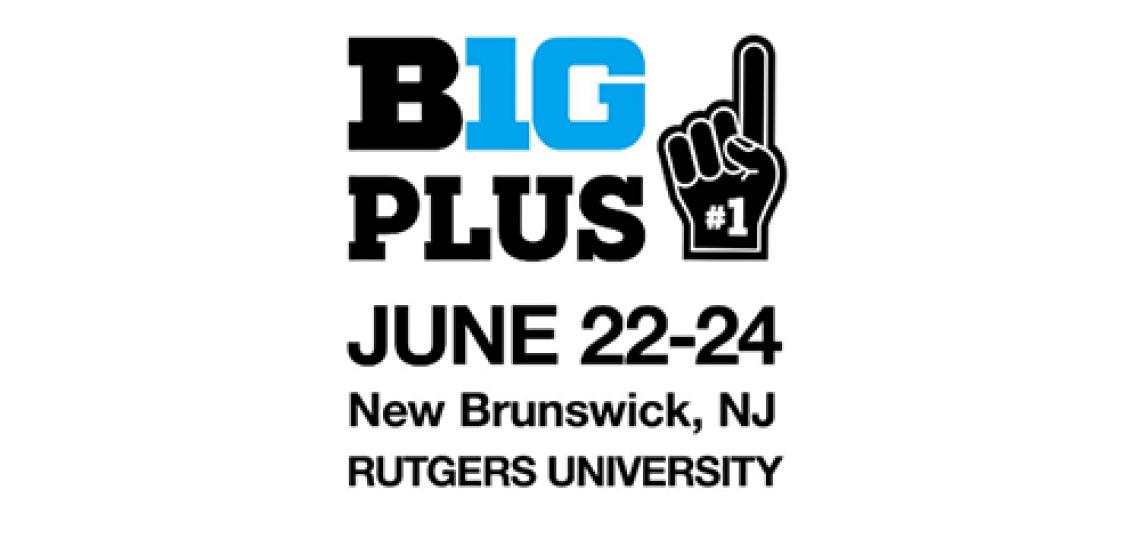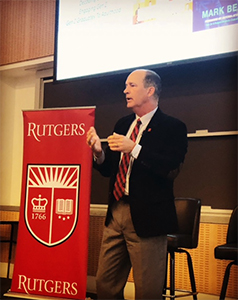
When it comes to delivering keynotes and other speeches and presentations, Assistant Professor of Professional Practice in Communication Mark Beal COM’89 is undoubtedly an expert. His expertise was recognized most recently when he was invited by Rutgers University to deliver the keynote speech at the Big Ten Plus Marketing and Communication Conference hosted by Rutgers from June 22 - 24, 2022.
During this keynote, he presented his research on Gen Z to marketing, public relations, and communications practitioners from the 14 Big Ten schools, along with representatives from the University of Notre Dame, Rice University, The University of Chicago, University of Illinois-Chicago, and Washington University in St. Louis.
A keynote speech is crucial part of any conference or event, Beal said, because it sets the tone for the audience and draws them in. However, successfully delivering a keynote, or any speech, in an engaging, compelling, clear, and informative manner is not a simple task and it requires a great deal of preparation, practice, and hard work.
 Beal has spent more than 30 years honing his craft. Prior to and during his career as a SC&I as a faculty member, Beal spent 30 years as a public relations practitioner and marketer, including his long and successful career as a partner of the New York City-based public relations firm Taylor.
Beal has spent more than 30 years honing his craft. Prior to and during his career as a SC&I as a faculty member, Beal spent 30 years as a public relations practitioner and marketer, including his long and successful career as a partner of the New York City-based public relations firm Taylor.
During his career he has led the strategic development and execution of award-winning public relations campaigns for Fortune 500 corporations. His campaigns have leveraged some of the world’s most popular sports and entertainment properties including the Olympic Games, World Series, NCAA March Madness, US Open Tennis, Super Bowl Halftime Show, and The Rolling Stones.
Beal is also the author of several books about Gen Z, including two he published in 2022, “Gen Z Graduates to Adulthood” and “The Purpose Generation: Leading Gen Z With Purpose” written with SC&I faculty member Richard Dool.
Given his expertise in public relations, marketing, and Generation Z, Beal is regularly invited to conduct media interviews and deliver keynotes and other presentations explaining his research findings on the ways Gen Z will transform media, marketing, the workplace, pop culture, and society.
Below, SC&I spoke with Beal about how he prepares to deliver keynotes, and he shares his best tips for making every presentation, whether it’s a one-on-one job interview or a speech to 500 attendees, more effective.
"The key to successfully prepare for any presentation, whether it’s a one-on-one job interview or a speech to 500 attendees, is research."
SC&I: Describe previous keynote presentations you’ve done. Did any specifically stick out to you?
MB: The most high-profile keynote speech I delivered was to Major League Baseball via Zoom between games six and seven of the 2020 World Series. There were approximately 450 executives from the league and all 30 Major League Baseball teams who joined my presentation to learn how to engage the next generation of baseball fans, Generation Z. More recently, I presented in-person to more than 250 executive recruiters at a national conference in Fort Worth, Texas. They also wanted to learn how to engage Gen Z, but they were interested from an employer standpoint with respect to how to recruit and retain the next generation of employees. No matter the audience I present to, whether a sports league, a leading corporation or industry trade association, they are all attempting to better understand Gen Z, the next generation of consumers and employees and how to effectively engage them.
SC&I: Explain how to best prepare for a keynote presentation. What are the most important qualities of a successful keynote presentation, in your opinion?
MB: The key to successfully prepare for any presentation, whether it’s a one-on-one job interview or a speech to 500 attendees, is research. The presenter needs to conduct many hours of unspectacular preparation and research because when the lights come on and the presenter takes to the stage, the audience wants to receive compelling insights and information. I believe as a presenter you must deliver a series of lightbulb or aha moments that not only inspire the audience but also provide information that is applicable to their work and business. The only way you can deliver those aha moments is through extensive research on the presentation topic and research regarding the audience you are presenting to.
SC&I: Are there any challenges or setbacks you’ve faced when preparing for a keynote? If so, explain how you overcame them.
MB: I was once delivering my Gen Z keynote speech in Las Vegas to a room filled with more than 400 professional ice hockey team executives. Within the first few seconds of my presentation, the lapel microphone I was wearing stopped working. You can't let something like that fluster you. The show must go on. As the technician walked on stage and was switching out my mic, I never stopped presenting. I simply went off script for a minute and engaged the audience with some questions. Once the new mic was clipped to my jacket, I picked up with where I left off when the original mic stopped working.
SC&I: You just gave a keynote address at the Big Ten Plus Marketing and Communication Conference hosted by Rutgers - congratulations! What was that like? Were there any ways in which preparing for this presentation was different from previous keynotes?
MB: It was an incredible privilege to be invited to deliver the keynote address at the Big Ten Plus Conference which consisted of marketing and communication professionals from all 14 Big Ten Universities plus the University of Notre Dame, Rice University, The University of Chicago, University of Illinois Chicago, and Washington University in St. Louis. They could have invited many other distinguished speakers, so I was honored that they even considered me. This audience wanted to better understand how to engage Gen Z ranging from current college students to recent alums. With that, I needed to provide relevant insights regarding what's important to Gen Z such as their prioritization of diversity and inclusion and being members of the purpose generation. I also had to share Gen Z's preferred media platforms for consuming news and information and what they are seeking from their college experience. It was critically important that I delivered actionable insights that each of the marketing and communication professionals in attendance could bring back to their universities and apply to future programs and campaigns designed to engage Gen Z. By doing that, I delivered measurable value to each and every conference attendee.
"From the moment a presentation starts, it is very important to engage the audience and pull them in within the first 60 seconds."
SC&I: Is there any other advice or tips you’d like to include when it comes to giving presentations/public speaking?
MB: While I believe that research and preparation are the critical foundational elements for delivering a successful presentation, if you do not present that research in a high-energy, enthusiastic, and engaging manner, the presentation will fall flat, and the audience will quickly be looking at their phones as they will have lost interest. From the moment a presentation starts, it is very important to engage the audience and pull them in within the first 60 seconds. I usually do that with a series of questions to get the audience involved. In the process of asking questions, I also start to learn the names of the audience members and I will frequently go back to those audience members and address them by name throughout the presentation. By doing that, I have created a personal connection. I often compare presenting a speech to being in the theater. With that, you should never be reading from a script. You also shouldn't memorize your lines. You should be delivering your storytelling in a compelling manner so that your audience is engaged from your first word to your last. If you can accomplish that, you have achieved success in presenting your speech.
Discover more about the Communication major at the Rutgers School of Communication and Information on the website.
